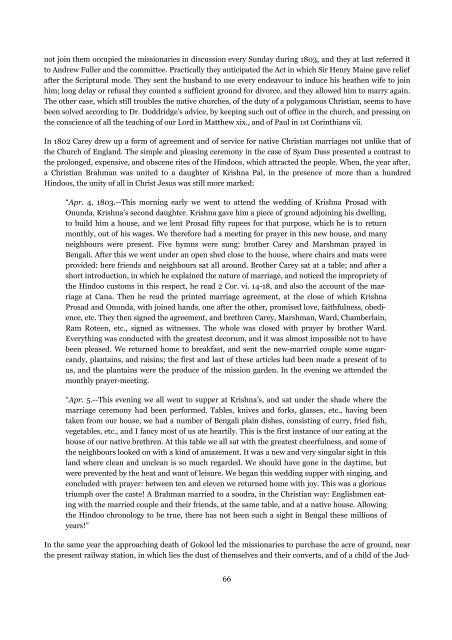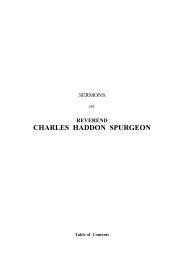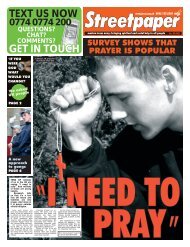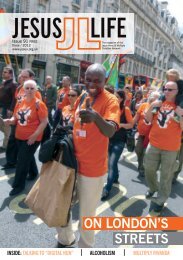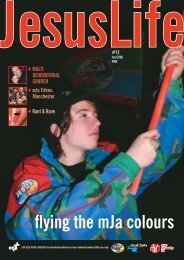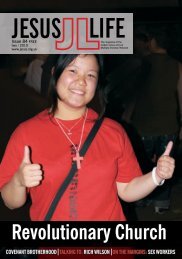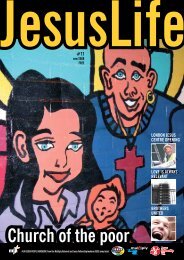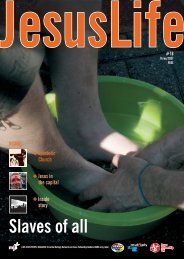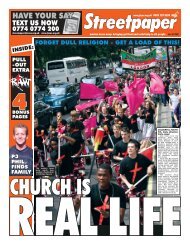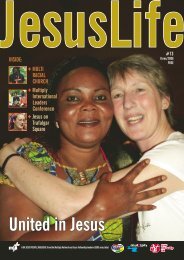Life of William Carey by George Smith - The Jesus Army
Life of William Carey by George Smith - The Jesus Army
Life of William Carey by George Smith - The Jesus Army
Create successful ePaper yourself
Turn your PDF publications into a flip-book with our unique Google optimized e-Paper software.
not join them occupied the missionaries in discussion every Sunday during 1803, and they at last referred it<br />
to Andrew Fuller and the committee. Practically they anticipated the Act in which Sir Henry Maine gave relief<br />
after the Scriptural mode. <strong>The</strong>y sent the husband to use every endeavour to induce his heathen wife to join<br />
him; long delay or refusal they counted a sufficient ground for divorce, and they allowed him to marry again.<br />
<strong>The</strong> other case, which still troubles the native churches, <strong>of</strong> the duty <strong>of</strong> a polygamous Christian, seems to have<br />
been solved according to Dr. Doddridge’s advice, <strong>by</strong> keeping such out <strong>of</strong> <strong>of</strong>fice in the church, and pressing on<br />
the conscience <strong>of</strong> all the teaching <strong>of</strong> our Lord in Matthew xix., and <strong>of</strong> Paul in 1st Corinthians vii.<br />
In 1802 <strong>Carey</strong> drew up a form <strong>of</strong> agreement and <strong>of</strong> service for native Christian marriages not unlike that <strong>of</strong><br />
the Church <strong>of</strong> England. <strong>The</strong> simple and pleasing ceremony in the case <strong>of</strong> Syam Dass presented a contrast to<br />
the prolonged, expensive, and obscene rites <strong>of</strong> the Hindoos, which attracted the people. When, the year after,<br />
a Christian Brahman was united to a daughter <strong>of</strong> Krishna Pal, in the presence <strong>of</strong> more than a hundred<br />
Hindoos, the unity <strong>of</strong> all in Christ <strong>Jesus</strong> was still more marked:<br />
“Apr. 4, 1803.--This morning early we went to attend the wedding <strong>of</strong> Krishna Prosad with<br />
Onunda, Krishna’s second daughter. Krishna gave him a piece <strong>of</strong> ground adjoining his dwelling,<br />
to build him a house, and we lent Prosad fifty rupees for that purpose, which he is to return<br />
monthly, out <strong>of</strong> his wages. We therefore had a meeting for prayer in this new house, and many<br />
neighbours were present. Five hymns were sung: brother <strong>Carey</strong> and Marshman prayed in<br />
Bengali. After this we went under an open shed close to the house, where chairs and mats were<br />
provided: here friends and neighbours sat all around. Brother <strong>Carey</strong> sat at a table; and after a<br />
short introduction, in which he explained the nature <strong>of</strong> marriage, and noticed the impropriety <strong>of</strong><br />
the Hindoo customs in this respect, he read 2 Cor. vi. 14-18, and also the account <strong>of</strong> the marriage<br />
at Cana. <strong>The</strong>n he read the printed marriage agreement, at the close <strong>of</strong> which Krishna<br />
Prosad and Onunda, with joined hands, one after the other, promised love, faithfulness, obedience,<br />
etc. <strong>The</strong>y then signed the agreement, and brethren <strong>Carey</strong>, Marshman, Ward, Chamberlain,<br />
Ram Roteen, etc., signed as witnesses. <strong>The</strong> whole was closed with prayer <strong>by</strong> brother Ward.<br />
Everything was conducted with the greatest decorum, and it was almost impossible not to have<br />
been pleased. We returned home to breakfast, and sent the new-married couple some sugarcandy,<br />
plantains, and raisins; the first and last <strong>of</strong> these articles had been made a present <strong>of</strong> to<br />
us, and the plantains were the produce <strong>of</strong> the mission garden. In the evening we attended the<br />
monthly prayer-meeting.<br />
“Apr. 5.--This evening we all went to supper at Krishna’s, and sat under the shade where the<br />
marriage ceremony had been performed. Tables, knives and forks, glasses, etc., having been<br />
taken from our house, we had a number <strong>of</strong> Bengali plain dishes, consisting <strong>of</strong> curry, fried fish,<br />
vegetables, etc., and I fancy most <strong>of</strong> us ate heartily. This is the first instance <strong>of</strong> our eating at the<br />
house <strong>of</strong> our native brethren. At this table we all sat with the greatest cheerfulness, and some <strong>of</strong><br />
the neighbours looked on with a kind <strong>of</strong> amazement. It was a new and very singular sight in this<br />
land where clean and unclean is so much regarded. We should have gone in the daytime, but<br />
were prevented <strong>by</strong> the heat and want <strong>of</strong> leisure. We began this wedding supper with singing, and<br />
concluded with prayer: between ten and eleven we returned home with joy. This was a glorious<br />
triumph over the caste! A Brahman married to a soodra, in the Christian way: Englishmen eating<br />
with the married couple and their friends, at the same table, and at a native house. Allowing<br />
the Hindoo chronology to be true, there has not been such a sight in Bengal these millions <strong>of</strong><br />
years!”<br />
In the same year the approaching death <strong>of</strong> Gokool led the missionaries to purchase the acre <strong>of</strong> ground, near<br />
the present railway station, in which lies the dust <strong>of</strong> themselves and their converts, and <strong>of</strong> a child <strong>of</strong> the Jud-<br />
66


